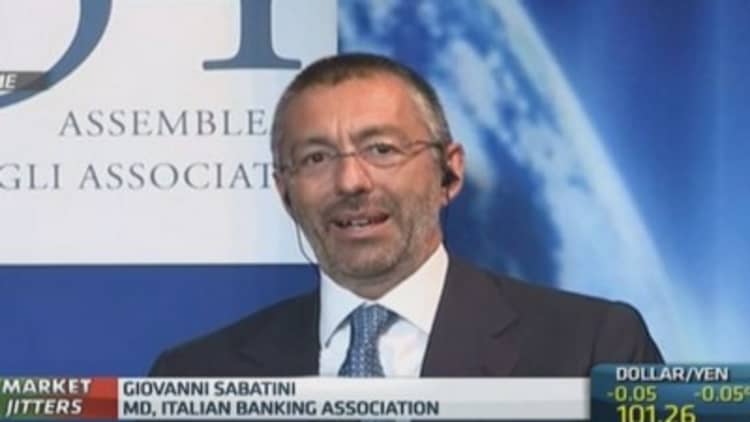Italy's banks are "quite well-prepared" for the upcoming European stress tests, the second-in-command at the country's central bank told CNBC—despite recent investor and rating agency concerns.
"Our perception is they are quite prepared. We will see what the result of the exercise will be, of course. Nobody knows," Salvatore Rossi, the senior deputy governor at Banca d'Italia, told CNBC in London.
After being caught up in the center of the European financial crisis, when the level and quality of their capital reserves severely shook the confidence in the region's financial sector, lenders face a wave of tests this year. The European Central Bank (ECB) is working in conjunction with the European Banking Authority to examine banks' ability to withstand another economic shock. A sample of 124 banks deemed "systemically important" will be tested, and results are expected in October.
One requirement is that banks meet a threshold of 8 percent for "tier one" common capital—a measure of banks' core equity capital—for a "baseline scenario" and 5.5 percent for an "adverse scenario".
Rossi said that Italian banks—the biggest of which are Unicredit and Intesa Sanpaolo in terms of domestic loan portfolio—had worked hard to improve their balance sheets in the run-up to the tests.
"They have increased, by quite a lot, their provisions against distressed assets…and then they have done a number of capital increases this year," he said.

While banking authorities have conducted regular tests since 2009, the results were roundly criticized for providing a true reflection of the state of bank finances. The 2014 round of tests has been billed as the toughest yet, with ECB President Mario Draghi warning that some banks would fail to reach the grade.
The tests are viewed as vital in clarifying the state of balance sheets and rebuilding investor confidence prior to the ECB taking on its new role as Europe's bank supervisor in November.
On Tuesday, Moody's reiterated its negative outlook for Italian banks.
"Asset quality continues to deteriorate, keeping pressure on banks to maintain adequate provisioning levels. Meanwhile, banks' core profitability remains weak against the backdrop of a stabilising but still fragile economy and low credit demand," analysts wrote in a report on the sector.
Moody's forecast the Italian economy would grow by under 1 percent in 2014 and 1-2 percent in 2015.
"The operating environment for banks remains challenging, because economic conditions in Italy are stabilising only gradually," analysts said.
Despite concerns, Rossi denied that Italian banks were in the same straits as Portugal's Espirito Santo. Speculation about a prospective default in the bank's parent group increased this week, after Espirito Santo International delayed paying short-term bondholders while Banque Privee Espirito Santo failed to pay some clients.
"I would not any make direct comparison between what is going on in Portugal—a situation on which I do not want to comment—and what is the situation in Italy," he told CNBC.
Read MorePortugal's bank woes just got more complicated
The Italian banking system recorded a 20.6 billion euro ($12.0 billion) net loss in 2013, according to Moody's, which expects core revenues to be at best marginally higher in 2014.
—By CNBC's Katy Barnato

